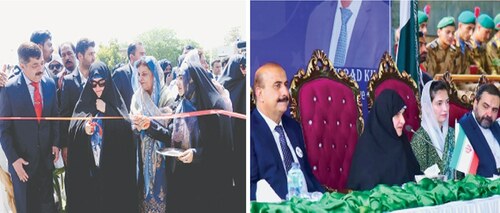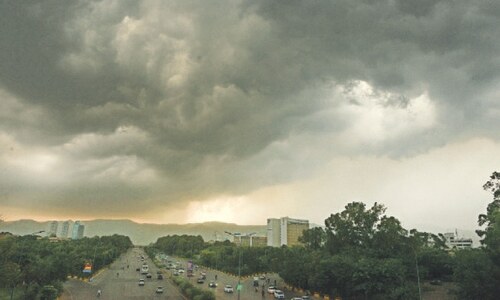ISLAMABAD: Sessions court judges will resume hearing cases today (Wednesday) after an unannounced pen-down strike that lasted over a month.
The judges consented to hearing cases following a visit by Islamabad High Court (IHC) Chief Justice Athar Minallah and inspection judge, Justice Mohsin Akhtar Kayani, to the district courts, where both high court judges also spoke to lawyers and assured them their legitimate concerns would be addressed.
The judges went on strike after lawyers built chambers illegally in court corridors, the parent-child meeting hall, the emergency exit, the litigants’ sitting area and the parking area reserved for judicial officers.
An official privy to the development said the judges changed their minds after the Islamabad Bar Council decided to seal all the illegally constructed chambers and threatened to cancel the practicing licences of anyone violating the council’s direction.
District Bar Association Islamabad (DBAI) Secretary Yasir Shakeel issued a notification Tuesday evening informing lawyers: “All the district courts will start hearing of the cases with effect from January 30, 2019. The honorable members are requested to appear before the courts to play their role in administration of justice to the litigants.”
The IHC chief justice told the lawyers that the judiciary was responsible for winning the confidence of litigants, who are the real stakeholders in the judicial system but remain at the receiving end. He urged the lawyers to play a pivotal role in making Islamabad’s judiciary an example for the rest of the country.
Meanwhile the DBAI continued its two-days-a-week strike seeking the rotation of judges.
Mr Shakeel hinted that the lawyers would call off the strike, saying: “This matter will be taken up in the forthcoming meeting of the bar association and I am very much confident that the outcome would be positive.”
Lawyers went on strike on Dec 21 last year over the rotation of judges. In the meantime, a few lawyers began building illegal chambers in front of the courtroom, which were demolished by the Capital Development Authority (CDA).
In retaliation, enraged lawyers detained 20 judges in courtrooms and announced a strike until their demand for the rotation of lower court judges was accepted. They later limited their strike to twice a week until the transfer and posting of lower court judges to other provinces.
During a visit to the Islamabad High Court Bar Association in February last year, former chief justice of Pakistan Mian Saqib Nisar had accepted this demand and assured the lawyers that judges would be rotated after the completion of formalities.
The matter, however, has lingered. A committee headed by the Attorney General of Pakistan Anwar Mansoor Khan has proposed that judges from Islamabad’s lower courts may be posted to federal government ministries and divisions within the capital.
The lawyers have rejected this proposal and insisted on inter-provincial postings, as they had been assured of by the former chief justice.
All 60 lower judiciary judges stopped working after the police’s Special Branch issued a security threat caused by the haphazard and illegally constructed chambers in front of courtrooms, in corridors, the hospitality centre, litigants shed and emergency exits of the district courts.
The issue of the Islamabad judiciary is rooted in the establishment of the city, whose planners ignored the courts in the capital’s plan. Since then, the lower courts have been operating in makeshift arrangements.
In 2005, the government had planned to shift the lower courts to a newly-built district court complex, but the plan was deferred after the October 2005 earthquake. Two years later, the Islamabad High Court was established in the district courts complex in the absence of building for the high court.
Lawyers have encroached upon greenbelts, pavement, open spaces within and surrounding the district courts and have even occupied a football ground.
Published in Dawn, January 30th, 2019














































Dear visitor, the comments section is undergoing an overhaul and will return soon.